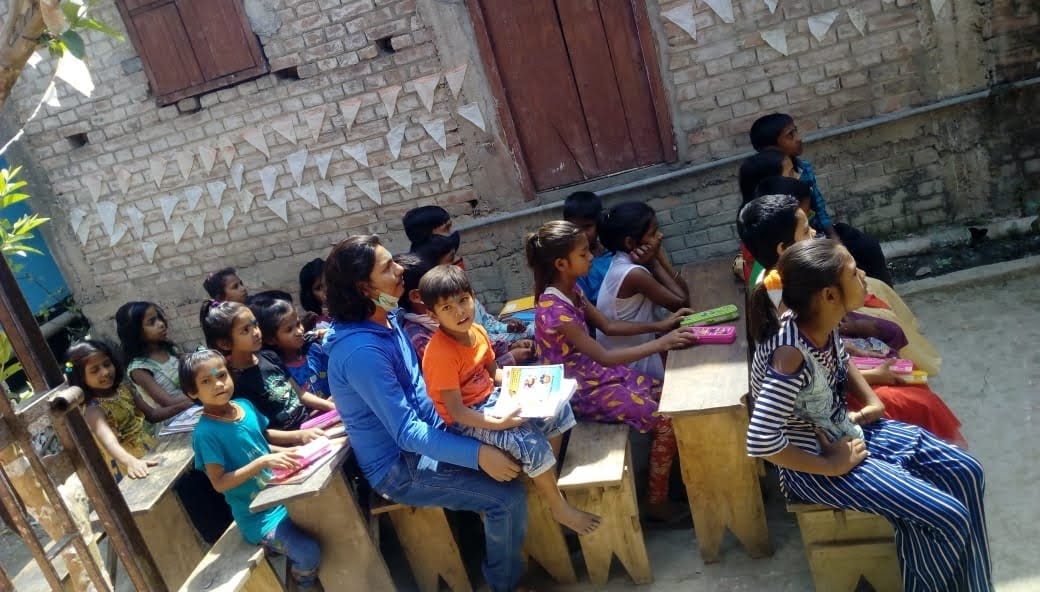SPOTLIGHT: Untouchability to Empowerment, Taxila's Mission of Social Change

Harsh Raj drove alone. In the district of Vaishali, he visited over 14 villages and 400 houses, carrying his vision of Taxila. Many of these villages are some of the poorest villages in India, yet there was hope that his learning centers could be the catalyst they needed to lift themselves out of poverty.
“A society’s greatness is measured by how it treats its weakest members,” once said Dr. B.R. Ambedkar, the renowned social reformer known as the architect of the Indian constitution.
Dr. Ambedkar's Buddhist ideals and the founding of the People's Education Society in 1945 motivated one Bihar native to embark on this mission.
“It is important to reclaim and preserve Dalits' (Untouchables) historical cultural heritage,” says Raj, the Bihar native and recently the founder of Taxila Learning Centers. He continues, “Claiming history can bring confidence in them that they were not just Untouchables but had a rich cultural capital.”
The Dalits are people outside the caste system formerly known as the “untouchables.” They are considered to be ‘impure,’ and higher castes were forbidden to share the same resources or be in the same vicinity as the Dalits.
While the Indian Constitution abolished the practice of untouchability and discrimination based on caste in 1950, the caste system remains highly engrained in Indian society today.
The district of Bihar has around 2.5 million Dalits or 20% of its total population. It also has one of the lowest literacy rates in India at 61%. Of these, 51% of Bihar's women are literate, and 71% are males.
As Raj arrived at each village, he would initiate a village assembly with the help of the village leaders. "I approach them with a simple concept," says Raj. "Let's develop an organization based on Buddhist and Dr. Ambedkar's ideology built by the local villagers, starting with the learning centers."
As a devoted Buddhist, Raj does not conform to the caste system. Buddhism has historically and philosophically opposed social hierarchies that have been determined since birth in ancient India. This includes the caste system in India and other countries with caste systems. A concept that Raj hopes to transmit to the rural villages in Vaishali.
"Education not based on any ideology is of no use, as you are going to be the puppet of the same hands," says Raj.
It's now been a month since its conception, and Taxila has two learning centers, both in the district of Vaishali. In Sarai, you will find the primary learning center where 35 students are enrolled, and a recently opened extension branch in Mataiya with five enrolled students. It may be a small number for some, but keep in mind that the only expense that Raj paid for was six projectors.
But what about the costs for teachers, classrooms, and medical professionals? All acts of kindness. Classrooms are verandas or rooms offered by charitable households. All five teachers are volunteers, and two medical professionals have offered their services during their off hours.
The tuition fee for each student is 200 rupees (USD 2.4) per month, including books, stationery, and other learning materials. All students and their immediate families are also entitled to free medical treatment.
To try to explain the reasoning behind the volunteers and his motivation to pursue this venture, Raj explains that "when it comes to your own community, there is always a personal stake involved." he adds, "I am very honest with them because I know they have been looted many times (in the past)."
What Raj is referring to is the negative experiences villages had with local NGOs. He explained that local NGOs would arrive at villages promising to teach them valuable skills such as weaving in exchange for an amount of money from each family. In his example, the amount was 10,000 Rupees or USD 120. They would then bring the cloth and weaving equipment to the villages and begin teaching the women the basics of weaving. But would then suddenly leave within two weeks without any follow-up.
The village locals felt robbed, hurt, and, most of all, fearful of organizations coming to their village promising a way to a better life.
When asked how his approach differs from previous developmental organizations, the selling point is inclusiveness for all people in the village, regardless of their caste or religion. “I give them a dream to create their own institution” by establishing Taxila from the ground up.
Raj says his approach is to increase the people's capacity through the learning centers. To achieve a "united social unit that has the capacity to develop their own parallel institutions in the future, to give intellectual fights to the ruling elites."
All the students are from marginalized communities and lower castes, with most students ranging from five to ten years of age. They are taught in Hindi and English in Science, Social Sciences, and Math five days a week for one hour each day.
At the end of each of those one-hour classes, Raj would gather all the students and their guardians. Once gathered, he provides a lecture on social equality, the constraints of the caste system, Buddhist ideals, and the role of a parent. Ultimately, the task of Taxila is to change their mindsets.
"I want to change the mindset of parents that their children should get an education at a younger age," says Raj. He explained that most parents in the district see their children as economic assets and would only send them to school from eight years old. Now, he clearly sees the impact of his after-class lectures, with parents "now engaging as a guardian of their child. Previously, that sense of responsibility was not with them".
It is a learning center, as it is a social reform movement. It is an affordable education center for the lower castes and the marginalized, as it is a training center to cultivate youth leaders and change-makers. It is a room or veranda of a kind family that teaches social equality and progressive ideals. As it is the start of Taxila.

In the days after our interview with Harsh Raj, he expressed his doubts and concerns to me. He doubted whether he started too early. The complete lack of funding, lack of support, and the lack of like-minded individuals in his circle began to wean on him. At that point, he had 25 families that had enrolled their children in Taxila with the expectations he had promised. There was no turning back.
Later on, at the end of the first month of establishing Taxila. As he drove away from the learning center. The children swarmed around his car, waving him goodbye. He looked at their smiles and knew he had made the right choice.
To contact Taxila Learning Centers: harshvivekraj@gmail.com

